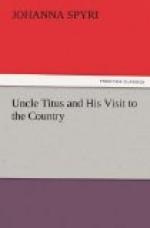The riddle was this:
“My first makes you
cry—not for sorrow,
For my second a spoon
you may borrow,
To my whole, you say,
‘thank you—to-morrow.’”
What could it be? Julius said it was “Hot-tea, because if the tea is very hot and you try to drink it, the tears start to your eyes, and then you cool it with a spoon, and you would like to let it stand till to-morrow.”
Hunne jumped for joy, crying “Wrong, wrong!”
Miss Hanenwinkel suggested “Plum-jam,” because Hunne often cried when he couldn’t have plums, and everybody ate jam with a spoon, and if plum-jam was not on the supper-table to-night, it was sure to be, to-morrow.
“Wrong! wrong!” cried Hunne again.
“Well, I guess Tear-ful,” said Rolf; but that was even worse than the others.
“I think it may be Snow-drop,” said the mother. “The sight of the snow makes you cry for joy, and a spoon is used for your drops if you are ill, and you always want snowdrops to-morrow.”
Mamma had failed! “Not Snowdrops; no!” screamed Hunne, almost beside himself with delight.
“I guess it is ice-cream,” said Mr. Birkenfeld. “Ice makes me cry sometimes, it is so cold. Cream certainly needs a spoon, and I have often heard the cry, ‘To-morrow please,’ when ice-cream has been mentioned.”
Hunne spun round with delight. “No, no!” he shouted. It was almost too good to be true, that his father should have missed it too. He scampered about crying out to everyone, “Guess! guess!”
Rolf was really vexed not to be able to see through this simple little “Hunne riddle” as he called it; and was mortified to perceive that he had made a worse guess than any one.
Meantime the days were passing. One morning at breakfast Uncle Titus said,
“My dear Ninette, our last week is drawing near. What should you say if we put off going home, another fortnight? I feel remarkably well here, no dizziness at all, and an extraordinary increase of strength in my legs!”
“You show it in your looks, my dear Titus—” said his wife tenderly, “you look ten years younger, at the very least, than when we came here.”
“And to my mind, this way of living has done you a world of good too, my dear Ninette;” replied he, “It seems to me that you find much less to lament over of late.”
“Everything is so different,” she answered; “It seems to me that everything has changed. The noise of the children even doesn’t seem the same, now that I know each one of them. I must say that I am very glad that we didn’t leave here that first week; I feel the loss of something pleasant now when I do not hear the children’s voices, and I am always a little uneasy if it is perfectly quiet in the garden.”
“It is just so with me,” said Uncle Titus, “and I cannot get through an evening with any satisfaction unless that bright boy has been in to see me, full of impatience to tell me what he has been about during the day, and eager to hear the enigmas I have to give him. It is a perfect pleasure to have such a young fellow about one.”




